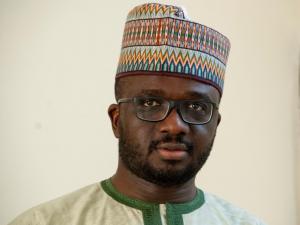Innover pour la santé au Niger
Niamey - Ibrahima Guimba Saidou, Minister Special Advisor to the President of the Republic of Niger and Director General of the National Agency for the Information Society, is leading the country's digital transformation. He explains the efforts the country is making to stimulate innovation in the health sector.
What is the government of Niger doing to encourage innovations in the health sector?
The government of Niger has decided to make innovation and technology one of the pillars of its socio-economic plans. This led to the creation of the National Agency for the Information Society (ANSI), in charge of our digital transformation program.
To encourage innovations in the health sector, our Ministry of Health has also set up an “e-Health” strategy, in collaboration with the National Agency for the Information Society and other partners. It is through this collaboration that several tools and solutions have been developed in order to resolve the challenges facing the health sector in Niger. This includes expanding telemedicine, launching a coding academy, and encouraging health-related startups.
At the start of the pandemic, we knew we would need coronavirus-specific innovations, so in May and June, we held a Coronahackathon. The competition was aimed at young Nigeriens to offer solutions for the management of COVID-19. In addition to identifying projects that could help in prevention and management (of the epidemic), projects on the management of sectors such as health, education, economy and administration during and after the crisis were also identified. Some of the projects identified included a fact-checking platform to refute bad information, health consultations using artificial intelligence, as well as telemedicine health follow-ups.
What are the most important innovation projects that Niger has promoted?
Niger is one of the youngest nations in the world. Over two-thirds of our population are under 25. However, we are not fully utilizing our human resources. Several of our most important innovation projects are aimed at helping young citizens reach their full potential.
For example, eTakara is a national competition for innovation organized by ANSI and is open to anyone under the age of 16. Through this competition, we identify and promote Nigerien talent and work to make digital technology accessible to all citizens. The winners of the competition receive support for one year to develop their innovation. Last year, we also opened the eTakara competition to innovators under the age of 14.
Some of these innovations are related to health. In 2018, a young man worked on the development of E-Bani, a device connected to a smartphone that can digitally detect the presence of malaria. The same year, a young woman developed applications to manage epidemics and create digital medical records. These kinds of innovations take time to develop and can provide us with tools to deal with the challenges we face.
Also, since our population resides in unconnected rural areas, we are working to bring connectivity to 15,000 communities. This innovation is called “Smart Villages”. By setting up a connection in a village, we are building information superhighways that can make information and knowledge available to rural people. This includes general medical care or education information. New information can increase productivity and, especially for young people, create a connection to the rest of the world that did not exist before.



